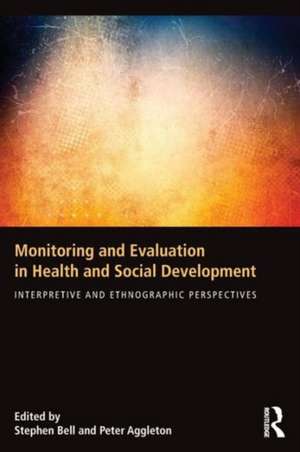Monitoring and Evaluation in Health and Social Development: Interpretive and Ethnographic Perspectives
Editat de Stephen Bell, Peter Aggletonen Limba Engleză Paperback – feb 2016
Two recent developments hold the potential to transcend these difficulties and to lead to important changes in the way in which the effects of health and social development programming are understood. First, there is growing interest in ways of monitoring programmes and assessing impact that are more grounded in the realities of practice than many of the ‘results-based’ methods currently utilised. Second, there are calls for the greater use of interpretive and ethnographic methods in programme design, monitoring and evaluation.
Responding to these concerns, this book illustrates the potential of interpretative methods to aid understanding and make a difference in real people’s lives. Through a focus on individual and community perspectives, and locally-grounded explanations, the methods explored in this book offer a potentially richer way of assessing the relationships between intent, action and change in health and social development in Africa, Asia, Europe and the Americas.
| Toate formatele și edițiile | Preț | Express |
|---|---|---|
| Paperback (1) | 401.27 lei 43-57 zile | |
| Taylor & Francis – feb 2016 | 401.27 lei 43-57 zile | |
| Hardback (1) | 1166.01 lei 43-57 zile | |
| Taylor & Francis – 5 feb 2016 | 1166.01 lei 43-57 zile |
Preț: 401.27 lei
Nou
Puncte Express: 602
Preț estimativ în valută:
76.78€ • 80.38$ • 63.53£
76.78€ • 80.38$ • 63.53£
Carte tipărită la comandă
Livrare economică 07-21 aprilie
Preluare comenzi: 021 569.72.76
Specificații
ISBN-13: 9781138844186
ISBN-10: 1138844187
Pagini: 274
Ilustrații: 44
Dimensiuni: 156 x 234 x 15 mm
Greutate: 0.39 kg
Ediția:1
Editura: Taylor & Francis
Colecția Routledge
Locul publicării:Oxford, United Kingdom
ISBN-10: 1138844187
Pagini: 274
Ilustrații: 44
Dimensiuni: 156 x 234 x 15 mm
Greutate: 0.39 kg
Ediția:1
Editura: Taylor & Francis
Colecția Routledge
Locul publicării:Oxford, United Kingdom
Public țintă
Postgraduate and UndergraduateCuprins
1. Interpretive and Ethnographic Perspectives – Alternative Approaches to Monitoring and Evaluation Practice Part 1: The Present Challenge 2. The Political Economy of Evidence: Personal Reflections on the Value of the Interpretive Tradition and its Methods 3. Measurement, Modification and Transferability: Evidential Challenges in the Evaluation of Complex Interventions 4. What Really Works? Understanding the Role of ‘Local Knowledges’ in the Monitoring and Evaluation of a Maternal, Newborn and Child Health Project in Kenya PART 2: Programme Design 5. Permissions, Vacations and Periods of Self-regulation: Using Consumer Insight to Improve HIV Treatment Adherence in Four Central American Countries 6. Generating Local Knowledge: A Role for Ethnography in Evidence-based Programme Design for Social Development 7. Interpretation, Context and Time: An Ethnographically Inspired Approach to Strategy Development for Tuberculosis Control in Odisha, India 8. Designing Health and Leadership Programmes for Young Vulnerable Women Using Participatory Ethnographic Research in Freetown, Sierra Leone Part 3: Monitoring Processes 9. Using Social Mapping Techniques to Guide Programme Redesign in the Tingim Laip HIV Prevention and Care Project in Papua New Guinea 10. Pathways to Impact: New Approaches to Monitoring and Improving Volunteering for Sustainable Environmental Management 11. Ethnographic Process Evaluation: A Case Study of an HIV Prevention Programme with Injecting Drug Users in the USA 12. Using the Reality Check Approach to Shape Quantitative Findings: Experience from Mixed Method Evaluations in Ghana and Nepal Part 4: Understanding Impact and Change 13. Innovation in Evaluation: Using SenseMaker to Assess the Inclusion of Smallholder Farmers in Modern Markets 14. The Use of the Rapid PEER Approach for the Evaluation of Sexual and Reproductive Health Programmes 15. Using Interpretive Research to Make Quantitative Evaluation More Effective: Oxfam's Experience in Pakistan and Zimbabwe 16. Can Qualitative Research Rigorously Evaluate Programme Impact? Evidence from a Randomised Controlled Trial of an Adolescent Sexual Health Programme in Tanzania
Notă biografică
Stephen Bell is a senior research fellow at the Kirby Institute, UNSW Australia, where he undertakes qualitative and ethnographic sexual health research with young people and other marginalised populations in rural and remote settings. His current interests involve examining how youth-led design of culturally and socially attuned sexual health programmes might evolve from, and be centred on, young people’s own everyday strategies of sexual health risk assessment and harm reduction.
Peter Aggleton is Scientia Professor in Education and Health in the Centre for Social Research in Health at UNSW Australia, where he is also Director of the Arts and Social Sciences Practical Justice Initiative. He has worked internationally in health and development for over 30 years, with a focus on health education and health promotion. He is an adjunct professor in the Australian Research Centre in Sex, Health and Society at La Trobe University, Australia, and holds visiting professorial positions at the UCL Institute of Education in London, UK, and at the University of Sussex, UK. Alongside his academic work, Peter has served as a senior adviser to numerous international agencies including UNAIDS, UNESCO, UNICEF and WHO.
Peter Aggleton is Scientia Professor in Education and Health in the Centre for Social Research in Health at UNSW Australia, where he is also Director of the Arts and Social Sciences Practical Justice Initiative. He has worked internationally in health and development for over 30 years, with a focus on health education and health promotion. He is an adjunct professor in the Australian Research Centre in Sex, Health and Society at La Trobe University, Australia, and holds visiting professorial positions at the UCL Institute of Education in London, UK, and at the University of Sussex, UK. Alongside his academic work, Peter has served as a senior adviser to numerous international agencies including UNAIDS, UNESCO, UNICEF and WHO.
Descriere
Current approaches to Monitoring and Evaluation (M&E) in health and social development are often expensive and are conducted in order to demonstrate success, rather than to learn how change occurs and what works within a particular context. Responding to these concerns, this book will illustrate the potential of interpretative methods to aid understanding and make a difference on the ground. Through a focus on individual and community perspectives, and locally-grounded explanations, the ethnographically-informed methods explored in this book offer a potentially richer way of assessing the relationships between intent, action and change in health and social development.


















